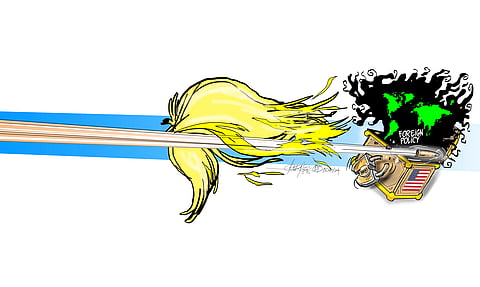
- NEWS
- the EDIT
- COMMENTARY
- BUSINESS
- LIFE
- SHOW
- ACTION
- GLOBAL GOALS
- SNAPS
- DYARYO TIRADA
- MORE

The increasing division in American politics that resulted in the attempt on the life of former US president Donald Trump will have deep effects on global peace.
In the region, which is marked by heightened tension due to the expansive territorial claims of rising power China, the US is deeply invested in maintaining a security balance.
Trump, who is known for his vitriolic speeches, was targeted at a campaign rally on Saturday in Pennsylvania.
As shots rang out, the 78-year-old Trump grimaced and clutched a hand to his right ear, with blood soon visible across his face.
Secret Service agents escorted him roughly off the stage, as Trump raised a fist to the crowd in defiance.
Trump is credited for stoking the flames that have been dividing his nation, but the problem in the world’s only superpower has a deep social root that the shrewd businessman successfully tapped into.
Trump filled the vacuum of engaging with poor citizens.
Many prominent Americans are considering the possibility of a second civil war due to the intense division in US society.
Billionaire investor Ray Dalio has expressed concerns that the current political climate has created a one-in-three chance for “civil war.”
In a recent interview with The Financial Times, Dalio expressed his vision of polarization in American politics contributing to an extremely “turbulent” time in history.
“We are now on the brink,” Dalio told the news outlet, adding that he sees a 35 to 40 percent probability of a second civil war.
Dalio clarified that the “civil war” he sees is not one where people “grab guns and start shooting” but one where people stop seeing the middle ground in politics.
“People move to different states that are more aligned with what they want and they don’t follow the decisions of federal authorities of the opposite political persuasion,” Dalio described the type of war he foresees.
A Pew Research Poll found that only 32 percent of Americans have a roughly equal number of conservative and liberal positions — compared to 49 percent in 2004.
Sociopolitical experts point to social media as having a great part to play in stoking the social chasm since it has become easy for like-minded extremists to connect and support each other, which emboldens people to take radical action.
The siege of the US Capitol on 6 January 2021 is always referred to in the discussion about the deep social wedge.
Most Americans are concerned about the split in the population becoming more pronounced in the run-up to the elections.
With the decision-makers focusing their attention on the rising conflict in their home country to prevent the outbreak of hostilities, the recent Trump event is expected to make matters worse for the Americans as a nation.
The Philippines should be prepared to adjust its foreign policy approach as the US is expected to slowly veer from its international exposure to devote more time to the heightening conflict inside its borders.
A high probability is a Trump victory in the November polls particularly with the recent event that is expected to add a dramatic twist to the former President’s effort to reclaim Washington.
Looking at the turbulence in his first term, Trump is expected to step up efforts to galvanize his supporters and the Republicans towards his America First ideals.
The oft-repeated ‘ironclad commitment’ will, no doubt, stay but the Philippines and the other strategic partners will have to take stock and have a reality check and admit it will not translate to any action.
The heightened tension in the US may, however, be a blessing in disguise to prompt a foreign policy that is not dependent on the social mood of any other nation.
